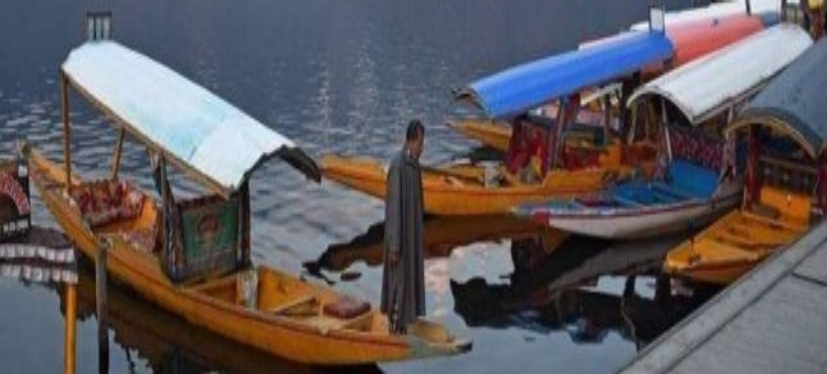J&K’s Marching Towards Progress

By
Farooq Wani
The state of Jammu and Kashmir (J&K) is at the heart of India’s nation-building vision of a secular, decentralised and diverse Union. The Central Government has expended substantial political, economic, diplomatic and military resources in the state since its accession to India and even today, J&K remains one of the key national security preoccupations due to Pakistan’s belligerence. With China and Pakistan having illegally occupied parts of J&K, makes this issue a difficult needle to thread and Pakistan’s ongoing three-decade old proxy war in the form of militancy along with communally charged propaganda makes its handling extremely complicated.
Transformation of any region is based on the nature of challenges the region presents to its people. Opportunities emerge from challenges and there is no dearth of the same in the Union Territory of J&K.
The democratic machinery in J&K has been strengthened by holding elections to block development councils and ongoing district development council elections, which are a vital component of local government under the three-tier governance model in India. The polls included seats reserved for women to ensure their participation in mainstream politics. The panchayats, which represent the lowest level of local government in India, have been strengthened through the devolution of functions and funds of more than $200 million in the past year. This strengthening of grassroots governance has led to the union territory of J&K receiving three national awards for socio-economic development.
After New Delhi’s decision to reorganize the state of Jammu and Kashmir into two union territories: (J&K and Ladakh), the Central Government has been working in J&K to implement its vision for all-inclusive development, efficient governance, and socio-economic justice for disadvantaged sections of the population. These positive changes have resulted in quantum improvement in the lives of all segments of society and various laws enacted by the Central Government have been extended to cover the union territory of J&K. These laws include those designed to protect and promote the social, economic and political rights of women, children and the under-privileged, such as the Right to Free and Compulsory Education Act 2009, the Juvenile Justice (Care and Protection of Children) Act 2015, the Protection of Human Rights Act 1994, the Right to Information Act 2005, Official Language Bill 2020, and new domicile rules for the union territory.
In the field of agriculture, a unique market intervention scheme has been introduced for the famed Kashmiri apples, which led to more than 15,000 tons of this fruit being directly procured from farmers and money for the same directly transferred into their bank accounts. In addition, the world-famous Kashmiri saffron, which is the only saffron in the world that grows at an altitude of 1,600 to 1,800 meters, has been given a Geographical Indication (GI) tag to protect its unique identity and guarantee its point of origin.
In keeping with the promise of quick and transparent recruitment of workers for government jobs, the J&K government has advertised 10,000 posts at all levels under an accelerated recruitment process for young people, with 25,000 additional jobs to be filled in subsequent phases. The selection process for these jobs will give added weightage to applicants who are residents of the area, divorced women or orphaned girls, among other criteria. The government has also restored a program under which all government jobs will be reserved for residents of J&K.
In the field of education, 50 new educational institutions, offering 25,000 seats to students have been established and this represents the largest expansion in J&K in educational facilities in 70 years. More than 500,000 students have also taken advantage of a number of government scholarship schemes – a four-fold increase over the number during the previous year. Similarly, in the medical field, two All India Institutes of Medical Sciences, seven new medical colleges, five new nursing colleges and a State Cancer Institute are planned. A student health card scheme has also been launched to ensure better healthcare for school children.
To boost the infrastructure in J&K, more than 500 projects worth more than $80 million have been completed, and more than 2,000 projects worth nearly $800 million have been approved. Bottlenecks that had delayed projects in a number of sectors have been removed and many of those projects are now nearing completion. Jammu and Srinagar are being developed as modern, sustainable smart cities, in which 190 projects worth more than $900 million are planned. Proposals for a light rail transit system in both cities has also been approved. A first-ever housing, slum development, rehabilitation and township policy has been approved, under which the construction of 200,000 houses is planned. More than 300,000 households have also been given access to electricity for the first time in 70 years.
Seventeen dedicated COVID-19 hospitals have been set up which provide 60,000 beds, including 20,000 in intensive care and 25,000 in isolation units with oxygen facilities. Srinagar is one of 16 districts in the country that has been recognized for best practices in the management of the pandemic. The government has also acknowledged the need for an IT Park for start-ups and is planning to provide free office space to address some of the logistical challenges. Industries & Commerce Department will be establishing two IT Parks in Jammu and Srinagar.
J&K has tremendous potential in the tourism sector and being a labour-intensive industry tourism provides a very vast scope for employment opportunities in comparison to other industries. Tourism being a multi-segmental industry also provides a wide variety of jobs like hotel managers, receptionists, accountants, clerks, guides, travel agents, chefs, housekeeping staff, transport operators etc. Tourism provides good sustenance to the local population as well as revenue to the State exchequer.
Finally, J&K has got the recognition and support to fully exploit its true potential and the time has now arrived when the whole world is looking up to be a part of the celebration called Kashmir. With the change in mindset of the people, a new era of development, opportunity, hope and prosperity has begun. A partnership of the rest of the country with J&K, which is presently lagging behind, in India’s march to progress will help this Union Territory in becoming India’s shining crown.
The government is fully committed to work with organizations, private players and other responsible agencies to create a positive environment to promote tourism, education, infrastructure, skill development, entrepreneurship and economy in the valley. The work has begun and the results may take time to manifest, but since the intent is to genuinely help the masses, there’s no doubt that J&K will become India’s latest success story!



